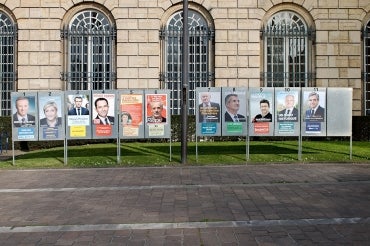Could France's election spell the end of the EU? U of T expert weighs in

Published: April 20, 2017
With the first round of voting in the French presidential elections starting Sunday, the latest polls show that the race remains tight.
It has all the makings of an unusual election. The unpopular current president, François Hollande, isn't seeking re-election – a first for an incumbent in modern French history.
In another twist, neither candidate of the two main parties appears to be ahead. Instead, a recent poll suggested that independent centrist Emmanuel Macron and the far-right's Marine Le Pen were on top.
If no candidate wins more than 50 per cent of the vote initially, a run-off between the top-two candidates will be held in May.
U of T News talked to Randall Hansen, a political science professor in the Faculty of Arts & Science and the director of the Centre for European, Russian and Eurasian Studies in the Munk School of Global Affairs, about the key issues in France and how the election might affect the future of the European Union.

It will not be politics as usual. It will, we hope, be a situation in which a young, dynamic, pro-European president has no majority in the National Assembly, and not much of a basis in any party. The reduction of presidential terms from seven years to five, to match the National Assembly elections taking place in June, was meant to avoid this outcome.
In the worst-case scenario, we have either a candidate of the far-right or – though this is less likely – a candidate of the far left that plans to destroy the European Union.
What are the most important issues in this election?
They are the economy – above all youth unemployment – security and the European Union.
How could it affect the European Union? Is a Frexit likely?
It all depends on the result. If, which seems likely, the two-ballot system (France has a majoritarian, two-ballot system at the presidential level) keeps Le Pen out of the Élysée Palace and puts Macron in, then there is no chance of France leaving the EU.
If Le Pen wins, the chance increases, but it is not a certainty. She will not have a majority in the National Assembly, and it will block any withdrawal bill. She will then, like Charles de Gaulle, try to go over their heads with a referendum. If a French ‘leave’ wins, which is again unlikely, France would leave the EU, and there would be no EU.
If Mélenchon, the far-left candidate, were to win at the second ballot, the same dynamics would play out.
When Marine Le Pen’s father made it to the presidential run-off in 2002, there was a public outcry that led to his defeat. What do you expect will happen if she advances to the second round?
There will be no outcry. Everyone expects it and the markets have priced it in.
The outcry would follow a victory. There is little chance of that unless Mélenchon makes it to the second ballot. It would then be very likely that she wins but not certain.
There are reports of more fake news and Russian meddling in this election. Are these concerns valid?
Entirely. Russia has funded the Front National and far-right parties across Europe for years. Russian-funded organizations have spread lies about Macron in an effort to benefit Le Pen. It’s illegal and disgusting, but it’s standard fare and a classic weapon of the weak.



